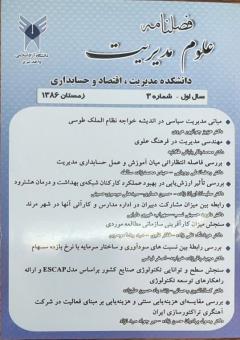مبانی مدیریت سیاسی در اندیشه خواجه نظام الملک طوسی
محورهای موضوعی : مدیریت بازرگانی
1 - عضو هیأت علمی گروه علوم سیاسی،واحد تبریز،دانشگاه آزاد اسلامی، تبریز،ایران
کلید واژه: فلسفه سیاسی مسلمین, روش های مدیریت سیاسی, خواجه نظام الملک طوسی, قرن پنجم هجری,
چکیده مقاله :
مدیریت در معنای مدرن آن رفتاری است که فرد به نسبت موقعیت و جایگاهی که در اختیار دارد برای تمشیت امور سازمان زیر نظر خود انجام می دهد. اما این رفتار همواره می باید بر پایه ای نظری استوار باشد؛ به تعبیر دیگر آنچه که نوع وسنخ رفتار یک مدیر را سامان می دهد بنیان های تئوریک و ارزش هایی است که وی بدان باور دارد و از آن تبعیت می کند. این مبانی ممکن است بر اساس نوعی فلسفه ی عمل گرایانه یا کارکرد گرایانه و .. شکل گرفته باشد اما آنچه مسلم است این که لزوماً هر مدیریتی باید استراتژی مشخصی داشته باشد که ترسیم این استراتژی بر عهده نوعی تفکر متافیزیکی است که مدیر یا سیستم مدیریتی از آن تبعیت می کند.در این مقاله تلاش شده است که در یک مورد مطالعاتی تاثیر مبانی فکری و فلسفی بر روش مدیریتی یک مدیر بررسی و کاویده شود. بدین منظور خواجه نظام الملک طوسی، انتخاب گردیده است چراکه چندین ویژگی در وجود این شخص جمع شده است. اول این که از مدیران موفق و نوآور تمام ادوار تاریخ ایران می باشد و دوم این که به جهت آگاهی عمیقش از مبانی فلسفه سیاسی مسلمین مدیریت خود را بر اساس استراتژی و اندیشه خاصی سامان بخشیده است.
Management, in its modern sense, refers to the behavior that one, holding a managerial position, displays in order to conduct the organization under his control. This behavior is inevitably based on some theoretical principles. That is to say, the theoretical foundation of a manager's value systems and beliefs contributes to efficiently organizing his conduct. The basis of such underlying convictions might be either a function-based or an action-based philosophy. Thus, any management needs to be executed via a particular strategy which, in turn, might be informed or even dictated by the metaphysical views of the manager. This study presents a case-study of the impact of Khajeh Nezam-Al-Molk-eTousi's ideational and philosophical views on his managerial conduct. There are two reasons for the selection of this person.Firstly, Khajeh Nezam-Al-Molk is one of the most successful authoritative figures in the history of Iran highly praised andreputable for his innovative conduct. Secondly, evident in his managerial career and conduct is a particular type of strategy which can be regarded as the natural consequence of his profound understanding of the principles of Islamic political philosophy.
Nazalolk, Kh. N., & Tabatabai, S. J. (1996). Nasiri First Printing, (In Persian).
Oshidri, J. (1992). Encyclopedia of Madzina. Tehran: Nashr Publication, (In Persian).
Tabatabai, S. J. (1993). Philosophical Income on Political History in Iran. Tehran: Kavir Publication, (In Persian).
Tabatabai, S. J. (1993). The Path of Political Thought in Iran. Tehran: Kavir Publication, (In Persian).
Tusi, N. A. M. (1992). Politics. Shoalar Jiby Bookstore, (In Persian).
_||_
Nazalolk, Kh. N., & Tabatabai, S. J. (1996). Nasiri First Printing, (In Persian).
Oshidri, J. (1992). Encyclopedia of Madzina. Tehran: Nashr Publication, (In Persian).
Tabatabai, S. J. (1993). Philosophical Income on Political History in Iran. Tehran: Kavir Publication, (In Persian).
Tabatabai, S. J. (1993). The Path of Political Thought in Iran. Tehran: Kavir Publication, (In Persian).
Tusi, N. A. M. (1992). Politics. Shoalar Jiby Bookstore, (In Persian).


